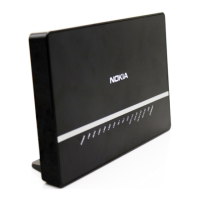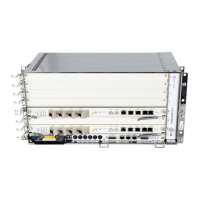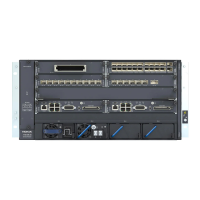Virtual Private Routed Network Service
430
FD 100/320Gbps NT and FX NT IHub Services Guide
3HH-11985-AAAA-TQZZA Issue: 13
7.7.4.1 Configuring VPRN BGP Group and Neighbor
Parameters
A group is a collection of related VPRN BGP peers. The group name should be a
descriptive name for the group. Follow your group, name, and ID naming
conventions for consistency and to help when troubleshooting faults.
All parameters configured for a peer group are applied to the group and are inherited
by each peer (neighbor), but a group parameter can be overridden on a specific
neighbor-level basis.
After a group name is created and options are configured, neighbors can be added
within the same autonomous system to create IBGP connections and/or neighbors
in different autonomous systems to create EBGP peers. All parameters configured
for the peer group level are applied to each neighbor, but a group parameter can be
overridden on a specific neighbor basis.
7.7.4.2 VPRN BGP CLI Syntax
Configuring BGP in the scope of a VPRN service is quite similar to configuring BGP
for the Base router. For examples, refer to the IHUB Router Configuration and
Protocols Guide.
Use the CLI syntax to configure VPRN BGP parameters (see “BGP Configuration
Commands”).
7.7.5 Configuring VPRN Protocols - RIP
PE routers which attach to a particular VPN need to know, for each of that VPN's
sites, which addresses in that VPN are at each site. There are several ways that a
PE router can obtain this set of addresses. The Routing Information Protocol (RIP)
sends routing update messages that include entry changes. The routing table is
updated to reflect the new information.
RIP can be used as a PE/CE distribution technique. PE and CE routers may be RIP
peers, and the CE may use RIP to tell the PE router the set of address prefixes which
are reachable at the CE router's site. When RIP is configured in the CE, care must
be taken to ensure that address prefixes from other sites (i.e., address prefixes
learned by the CE router from the PE router) are never advertised to the PE.
Specifically, if a PE router receives a VPN-IPv4 route, and as a result distributes an
IPv4 route to a CE, then that route must not be distributed back from that CE's site
to a PE router (either the same router or different routers).
